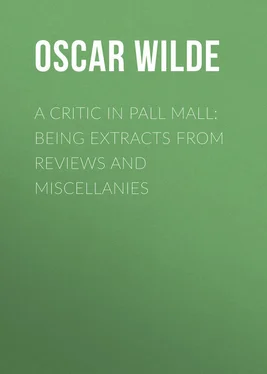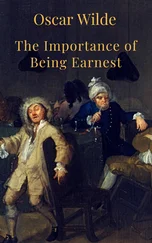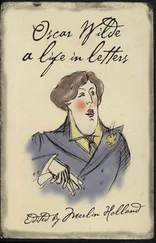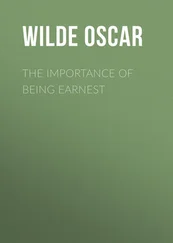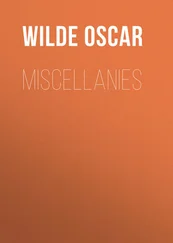Oscar Wilde - A Critic in Pall Mall - Being Extracts from Reviews and Miscellanies
Здесь есть возможность читать онлайн «Oscar Wilde - A Critic in Pall Mall - Being Extracts from Reviews and Miscellanies» — ознакомительный отрывок электронной книги совершенно бесплатно, а после прочтения отрывка купить полную версию. В некоторых случаях можно слушать аудио, скачать через торрент в формате fb2 и присутствует краткое содержание. Жанр: foreign_prose, на английском языке. Описание произведения, (предисловие) а так же отзывы посетителей доступны на портале библиотеки ЛибКат.
- Название:A Critic in Pall Mall: Being Extracts from Reviews and Miscellanies
- Автор:
- Жанр:
- Год:неизвестен
- ISBN:нет данных
- Рейтинг книги:5 / 5. Голосов: 1
-
Избранное:Добавить в избранное
- Отзывы:
-
Ваша оценка:
- 100
- 1
- 2
- 3
- 4
- 5
A Critic in Pall Mall: Being Extracts from Reviews and Miscellanies: краткое содержание, описание и аннотация
Предлагаем к чтению аннотацию, описание, краткое содержание или предисловие (зависит от того, что написал сам автор книги «A Critic in Pall Mall: Being Extracts from Reviews and Miscellanies»). Если вы не нашли необходимую информацию о книге — напишите в комментариях, мы постараемся отыскать её.
A Critic in Pall Mall: Being Extracts from Reviews and Miscellanies — читать онлайн ознакомительный отрывок
Ниже представлен текст книги, разбитый по страницам. Система сохранения места последней прочитанной страницы, позволяет с удобством читать онлайн бесплатно книгу «A Critic in Pall Mall: Being Extracts from Reviews and Miscellanies», без необходимости каждый раз заново искать на чём Вы остановились. Поставьте закладку, и сможете в любой момент перейти на страницу, на которой закончили чтение.
Интервал:
Закладка:
And what a world it is! What a panorama of passions! What a pell-mell of men and women! It was said of Trollope that he increased the number of our acquaintances without adding to our visiting list; but after the Comédie Humaine one begins to believe that the only real people are the people who never existed. Lucien de Rubempré, le Père Goriot, Ursule Mirouët, Marguerite Claës, the Baron Hulot, Madame Marneffe, le Cousin Pons, De Marsay – all bring with them a kind of contagious illusion of life. They have a fierce vitality about them: their existence is fervent and fiery-coloured; we not merely feel for them but we see them – they dominate our fancy and defy scepticism. A steady course of Balzac reduces our living friends to shadows, and our acquaintances to the shadows of shades. Who would care to go out to an evening party to meet Tomkins, the friend of one’s boyhood, when one can sit at home with Lucien de Rubempré? It is pleasanter to have the entrée to Balzac’s society than to receive cards from all the duchesses in Mayfair.
In spite of this, there are many people who have declared the Comédie Humaine to be indigestible. Perhaps it is: but then what about truffles? Balzac’s publisher refused to be disturbed by any such criticism as that. ‘Indigestible, is it?’ he exclaimed with what, for a publisher, was rare good sense. ‘Well, I should hope so; who ever thinks of a dinner that isn’t?’
Balzac’s Novels in English. The Duchesse de Langeais and Other Stories ; César Birotteau . (Routledge and Sons.)
BEN JONSON
As for Mr. Symonds’ estimate of Jonson’s genius, it is in many points quite excellent. He ranks him with the giants rather than with the gods, with those who compel our admiration by their untiring energy and huge strength of intellectual muscle, not with those ‘who share the divine gifts of creative imagination and inevitable instinct.’ Here he is right. Pelion more than Parnassus was Jonson’s home. His art has too much effort about it, too much definite intention. His style lacks the charm of chance. Mr. Symonds is right also in the stress he lays on the extraordinary combination in Jonson’s work of the most concentrated realism with encyclopædic erudition. In Jonson’s comedies London slang and learned scholarship go hand in hand. Literature was as living a thing to him as life itself. He used his classical lore not merely to give form to his verse, but to give flesh and blood to the persons of his plays. He could build up a breathing creature out of quotations. He made the poets of Greece and Rome terribly modern, and introduced them to the oddest company. His very culture is an element in his coarseness. There are moments when one is tempted to liken him to a beast that has fed off books.
We cannot, however, agree with Mr. Symonds when he says that Jonson ‘rarely touched more than the outside of character,’ that his men and women are ‘the incarnations of abstract properties rather than living human beings,’ that they are in fact mere ‘masqueraders and mechanical puppets.’ Eloquence is a beautiful thing but rhetoric ruins many a critic, and Mr. Symonds is essentially rhetorical. When, for instance, he tells us that ‘Jonson made masks,’ while ‘Dekker and Heywood created souls,’ we feel that he is asking us to accept a crude judgment for the sake of a smart antithesis. It is, of course, true that we do not find in Jonson the same growth of character that we find in Shakespeare, and we may admit that most of the characters in Jonson’s plays are, so to speak, ready-made. But a ready-made character is not necessarily either mechanical or wooden, two epithets Mr. Symonds uses constantly in his criticism.
We cannot tell, and Shakespeare himself does not tell us, why Iago is evil, why Regan and Goneril have hard hearts, or why Sir Andrew Aguecheek is a fool. It is sufficient that they are what they are, and that nature gives warrant for their existence. If a character in a play is lifelike, if we recognize it as true to nature, we have no right to insist on the author explaining its genesis to us. We must accept it as it is: and in the hands of a good dramatist mere presentation can take the place of analysis, and indeed is often a more dramatic method, because a more direct one. And Jonson’s characters are true to nature. They are in no sense abstractions; they are types. Captain Bobadil and Captain Tucca, Sir John Daw and Sir Amorous La Foole, Volpone and Mosca, Subtle and Sir Epicure Mammon, Mrs. Purecraft and the Rabbi Busy are all creatures of flesh and blood, none the less lifelike because they are labelled. In this point Mr. Symonds seems to us unjust towards Jonson.
We think, also, that a special chapter might have been devoted to Jonson as a literary critic. The creative activity of the English Renaissance is so great that its achievements in the sphere of criticism are often overlooked by the student. Then, for the first time, was language treated as an art. The laws of expression and composition were investigated and formularized. The importance of words was recognized. Romanticism, Realism and Classicism fought their first battles. The dramatists are full of literary and art criticisms, and amused the public with slashing articles on one another in the form of plays.
‘English Worthies.’ Edited by Andrew Lang. Ben Jonson . By John Addington Symonds. (Longmans, Green and Co.)
MR. SYMONDS’ HISTORY OF THE RENAISSANCE
Mr. Symonds has at last finished his history of the Italian Renaissance. The two volumes just published deal with the intellectual and moral conditions in Italy during the seventy years of the sixteenth century which followed the coronation of Charles the Fifth at Bologna, an era to which Mr. Symonds gives the name of the Catholic Reaction, and they contain a most interesting and valuable account of the position of Spain in the Italian peninsula, the conduct of the Tridentine Council, the specific organization of the Holy Office and the Company of Jesus, and the state of society upon which those forces were brought to bear. In his previous volumes Mr. Symonds had regarded the past rather as a picture to be painted than as a problem to be solved. In these two last volumes, however, he shows a clearer appreciation of the office of history. The art of the picturesque chronicler is completed by something like the science of the true historian, the critical spirit begins to manifest itself, and life is not treated as a mere spectacle, but the laws of its evolution and progress are investigated also. We admit that the desire to represent life at all costs under dramatic conditions still accompanies Mr. Symonds, and that he hardly realizes that what seems romance to us was harsh reality to those who were engaged in it. Like most dramatists, also, he is more interested in the psychological exceptions than in the general rule. He has something of Shakespeare’s sovereign contempt of the masses. The people stir him very little, but he is fascinated by great personalities. Yet it is only fair to remember that the age itself was one of exaggerated individualism, and that literature had not yet become a mouthpiece for the utterances of humanity. Men appreciated the aristocracy of intellect, but with the democracy of suffering they had no sympathy. The cry from the brickfields had still to be heard. Mr. Symonds’ style, too, has much improved. Here and there, it is true, we come across traces of the old manner, as in the apocalyptic vision of the seven devils that entered Italy with the Spaniard, and the description of the Inquisition as a Belial-Moloch, a ‘hideous idol whose face was blackened with soot from burning human flesh.’ Such a sentence, also, as ‘over the Dead Sea of social putrefaction floated the sickening oil of Jesuitical hypocrisy,’ reminds us that rhetoric has not yet lost its charms for Mr. Symonds. Still, on the whole, the style shows far more reserve, balance and sobriety, than can be found in the earlier volumes where violent antithesis forms the predominant characteristic, and accuracy is often sacrificed to an adjective.
Читать дальшеИнтервал:
Закладка:
Похожие книги на «A Critic in Pall Mall: Being Extracts from Reviews and Miscellanies»
Представляем Вашему вниманию похожие книги на «A Critic in Pall Mall: Being Extracts from Reviews and Miscellanies» списком для выбора. Мы отобрали схожую по названию и смыслу литературу в надежде предоставить читателям больше вариантов отыскать новые, интересные, ещё непрочитанные произведения.
Обсуждение, отзывы о книге «A Critic in Pall Mall: Being Extracts from Reviews and Miscellanies» и просто собственные мнения читателей. Оставьте ваши комментарии, напишите, что Вы думаете о произведении, его смысле или главных героях. Укажите что конкретно понравилось, а что нет, и почему Вы так считаете.
